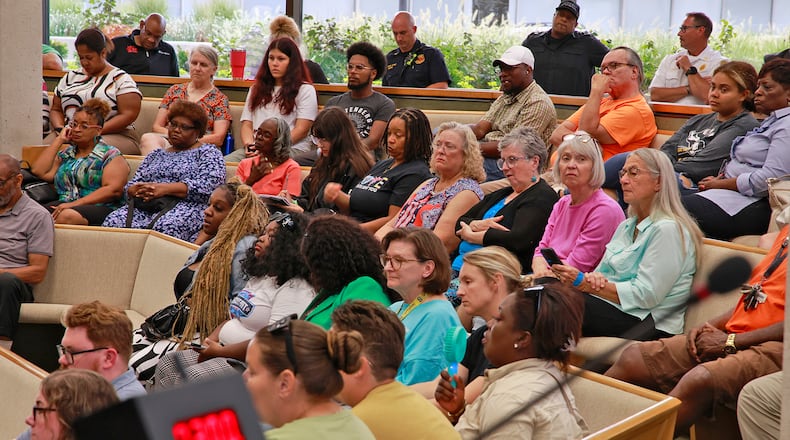Krystal Brown, a Springfield city commissioner and member of the NAACP, said there are genuine concerns, particularly with driving safety, and she wanted to make sure everyone felt safe sharing their thoughts during the forum.
“Someone told me, ‘It feels like you’re forcing this down our throats and you want to make it like everything is all rainbows and sunshine,’ ” Brown said. “So I want to make sure that we are holding space for individuals who feel differently from that and making sure that we’re not coming across as lecturing or scolding.”
Springfield has seen a large influx of Haitian immigrants in the last five years or so, with estimates varying largely between 10,000-15,000 currently living in the area. The vast majority come through the parole immigration process and receive Temporary Protected Status, a legal status.
Credit: Bill Lackey
Credit: Bill Lackey
More than 10 community members spoke, sharing a variety of concerns. One speaker, a Haitian immigrant named Rony Symmat, said that he and others left Haiti for a better life, and that Haitians who want to fold into the community need assistance from the community.
Symmat’s plea was often emotional, particularly as he spoke about wanting his four kids to have a better future. He was met several times with applause and cheers.
“They want to know how to drive but they need help. They want to know how to talk to you, how to act when they are close to you, but they don’t know that, most of them don’t know that; they just need help,” Symmat said through tears. " ... They see you as a family.”
Williams told Symmat “we love you” and thanked him for his courage. This was followed by a standing ovation and Williams telling him “you are welcome here.”
One community member, a white woman whom Brown invited to share her concerns, said allowing people to cross the border is causing “chaos” across the country.
“When it comes to Haitians, I’m an American. I don’t care what color any person is as long as they come here to be an American, and Haitians are not here to be Americans; they’re here to take what they can get from us taxpayers,” she said.
Credit: Bill Lackey
Credit: Bill Lackey
Williams said that while Springfield cannot control the borders, the community can vote to decide who is in the White House. She also encouraged everyone to join the NAACP and said she would like to take over the discussion.
Taylor Flora, who volunteers at the Warder Literacy Center, said that she feels many non-Haitian Springfielders do not understand the immigration mechanism allowing Haitians to enter the country. She emphasized that Haitians are in Springfield legally.
Temporary Protected Status allows an eligible person who receives approval to remain in the U.S. for a designated period of time but does not provide a direct path to citizenship. Those under TPS can apply for lawful permanent residence through several means.
One community member said that it’s important to work toward solutions, something she said many citizens are feeling is lacking.
Williams said the NAACP will step up to find these solutions, with a focus area being driver’s education to prevent car crashes.
Mia Perez, a local attorney who said she is married to a Haitian immigrant and who used to live in Haiti, said Haitians are here to stay and will work to become citizens. She encouraged an open dialogue and for everyone to learn from one another.
Harsh rhetoric and concerns regarding the Haitian community and lack of support for impacted local infrastructure like schools, housing and healthcare have dominated public comment at Springfield City Commission meetings held at City Hall. Mayor Rob Rue told the News-Sun after the forum that it was “excellent to have an open dialogue” and he was happy to see many regular attendees of commission meetings there.
Casey Rollins, Springfield’s St Vincent de Paul director, said during the forum her organization has been helping the Haitian population since the influx began, with Haitians seeing the nonprofit as a piece of home, as the St. Vincent de Paul organization is also in Haiti. She urged everyone to pause and take the time to learn from each other.
“Diversity is a fact. Equity is a choice. Inclusion is an action,” Rollins said. " ... Springfield is more than capable of achieving all of these ideals together.”
About the Author


